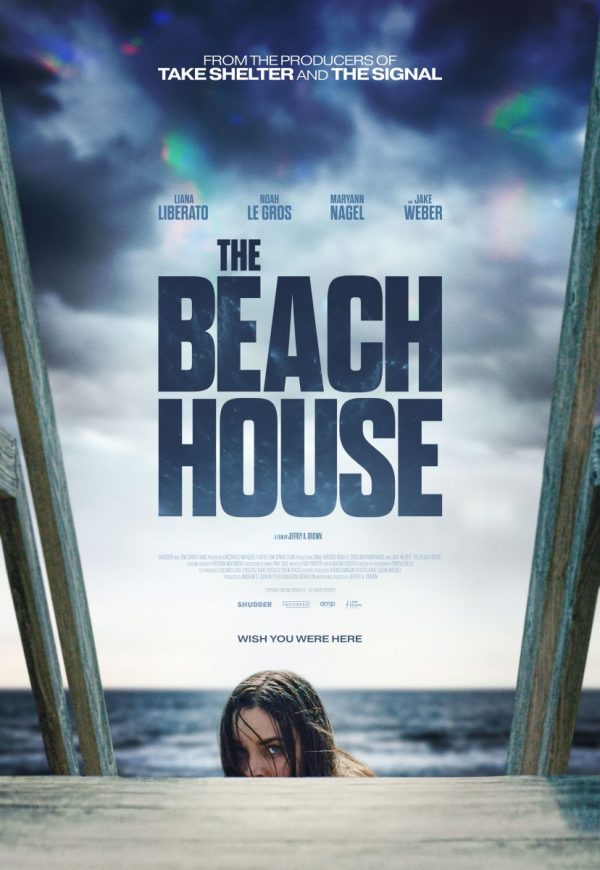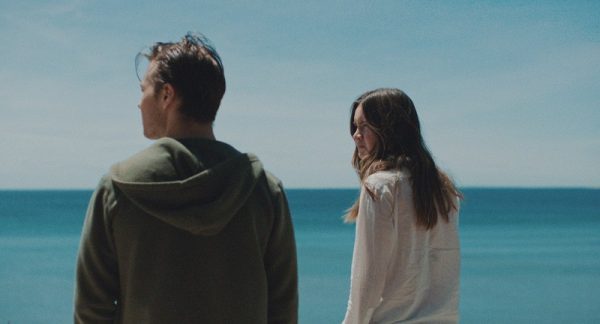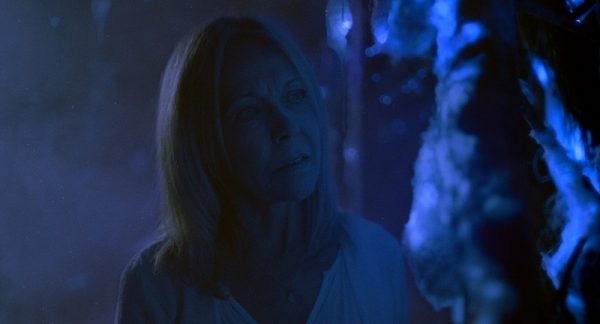The Beach House. 2020.
Directed by Jeffrey A. Brown.
Starring Liana Liberato, Noah Le Gros, Jake Weber, and Maryann Nagel.

SYNOPSIS:
A romantic getaway for two troubled college sweethearts turns into a struggle for survival when unexpected guests – and the surrounding environment – exhibit signs of a mysterious infection.

In a year that’s seen stealth H.P. Lovecraft inspirations (Underwater) and straightforward Lovecraftian adaptations (Color Out Of Space), Jeffrey A. Brown’s The Beach House is a surprise addition to 2020’s undercover Lovecraft movement. It’s environmental horror united with a walk through Pandora’s Lite-Brite forest that goes all The Mist or The Fog or Demon Wind (take your pick of evil smog flicks). Intrigue exists on a basic level of intellectually stimulating genre prodding, something like Sea Fever, but lacks an ending that could have sealed the film’s inevitable fate with greater staying power. As is, it washes away into the frothiness of crashing wakes, but something is missing from a third act that loses momentum instead of churns a furious speed.
Young lovers Randall (Noah Le Gros) and Emily (Liana Liberato) sneak away to the boy’s family vacation house on a sandy stretch of coastal paradise. Too bad Randall didn’t ask permission, because other occupants are staying there as well. Old friends-of-parents Mitch (Jake Weber) and Jane (Maryann Nagel) complete the unlikely foursome after a scheduling double-up, but everyone agrees to be each other’s company. It’s a vacation, after all! One that turns into a fight for survival when bioluminescent glows reflect off the water, bringing a thick fog that rolls in, which may or may not be something far worse.

It’s in these Lovecraftian glimpses of neon-noxious gardens and slimy creature-influenced effects that The Beach House indeed impresses. Emily’s ambitions to study Astrobiology on a graduate-level introduce the script’s thoughts on evolutionary fragility. Oceanic waters are promoted as submerged planets yet to be discovered, where, as Emily puts it, “Organisms adapt to extreme environments and chemistry becomes biology.” We think we’re in control of Earth (the hubris), and yet there’s so much left undiscovered 20,000 leagues below surface waves. Brown is in awe of unknown wonders and wields these ambiguous questions with a tempest’s fury once unidentifiable objects start washing ashore. Cinematography proficient in hazy kaleidoscope disorientation and stoner-rave color pops only accentuates these “oohs” and “aahs.”
What’s going to throw audiences (into “love” or “hate” territory) is how The Beach House contains narrative storytelling. Brown keeps a central focus on Emily, Randall, Mitch, and Jane. He tells a story about unfathomable horrors that are so beyond our comprehension…they aren’t really shown. Humanity, as we know it, falls victim to molecular and elemental combustion that creates some apocalypse, but we’re only ever shown a small Nantucket-neat hideaway town that’s mostly vacated. Thus removing more expansive questions about how far-reaching the phenomenon could be, opting for horrors nestled deep inside your brain that aren’t of the visceral, in-your-face variety. In ways, Brown’s third act feels a bit incomplete. Dipping its toe into the shallows when it should be diving head-first into the deep end.
My confliction continues because I rather enjoy seeing Liana Liberato take control as Emily, the woman-of-research “final girl” whose boyfriend is the one weighed down by an alien affliction. Randall’s only contribution besides nudging his girlfriend out of further studies is getting everyone high with dosed chocolate, which blurs their senses when “the fog” first blankets bungalows. Emily is the one who pieces clues together, has to perform parasite removal surgery, and carries Randall around once “infected” hosts start foaming at the mouth (Jane, for one). It suits Liberato, and I’d love to see her take more heroine genre roles as a capable, take-no-shit protagonist who smartens while others devolve. Also, again, that parasite removal cut-out sequence. The Beach House gets credit for its practical effects, especially when they’re wormy or crustacean-creepy as bottom-dwellers may surface (and yes, THAT basement shot).
With The Beach House, you’re not getting any of the outright action of Underwater. Nor a continual drenching of Lovecraftian style that grows wilder and thornier as cosmic overtones take control like in Color Out Of Space. The Beach House, in conclusion, feels like a short story that expands into feature-length fulfillment, but the elongation opens no new doors. It’s a getaway thriller that’ll surely impress eco-horror ponderers who adore being “left on read,” but will frustrate those hoping for more interaction once the outbreak aspects start unleashing panic. Jeffrey A. Brown’s inquisitive filmmaking style will earn its rightful fans and is sound enough to show ample promise, but there’s divisiveness his getaway-gone-goopy can’t escape.
Flickering Myth Rating – Film: ★ ★ ★ / Movie: ★ ★
Matt spends his after-work hours posting nonsense on the internet instead of sleeping like a normal human. He seems like a pretty cool guy, but don’t feed him after midnight just to be safe (beers are allowed/encouraged). Follow him on Twitter/Instagram/Letterboxd (@DoNatoBomb).











